Climate Change and Its Impact on Transport - University Report
VerifiedAdded on 2022/09/03
|10
|1890
|27
Report
AI Summary
This report investigates the impact of climate change on the transport system within the United Kingdom. It begins with an introduction outlining the global concern surrounding climate change, its causes, and its effects, particularly on infrastructure and human health. The study then details the methodology employed, which involves a questionnaire distributed to UK citizens who frequently use the transport system. The questionnaire explores perceptions of climate change, its impact on transport, and changes observed in the transportation system. The report analyzes the data collected using qualitative data analysis techniques to understand the effects of climate change on the transportation system in the UK. The findings suggest that rising temperatures and other climate-related issues are affecting the transport infrastructure and user behavior. The report concludes by emphasizing the need for modifications in the transport system to accommodate the changing climate and mitigate its adverse effects.
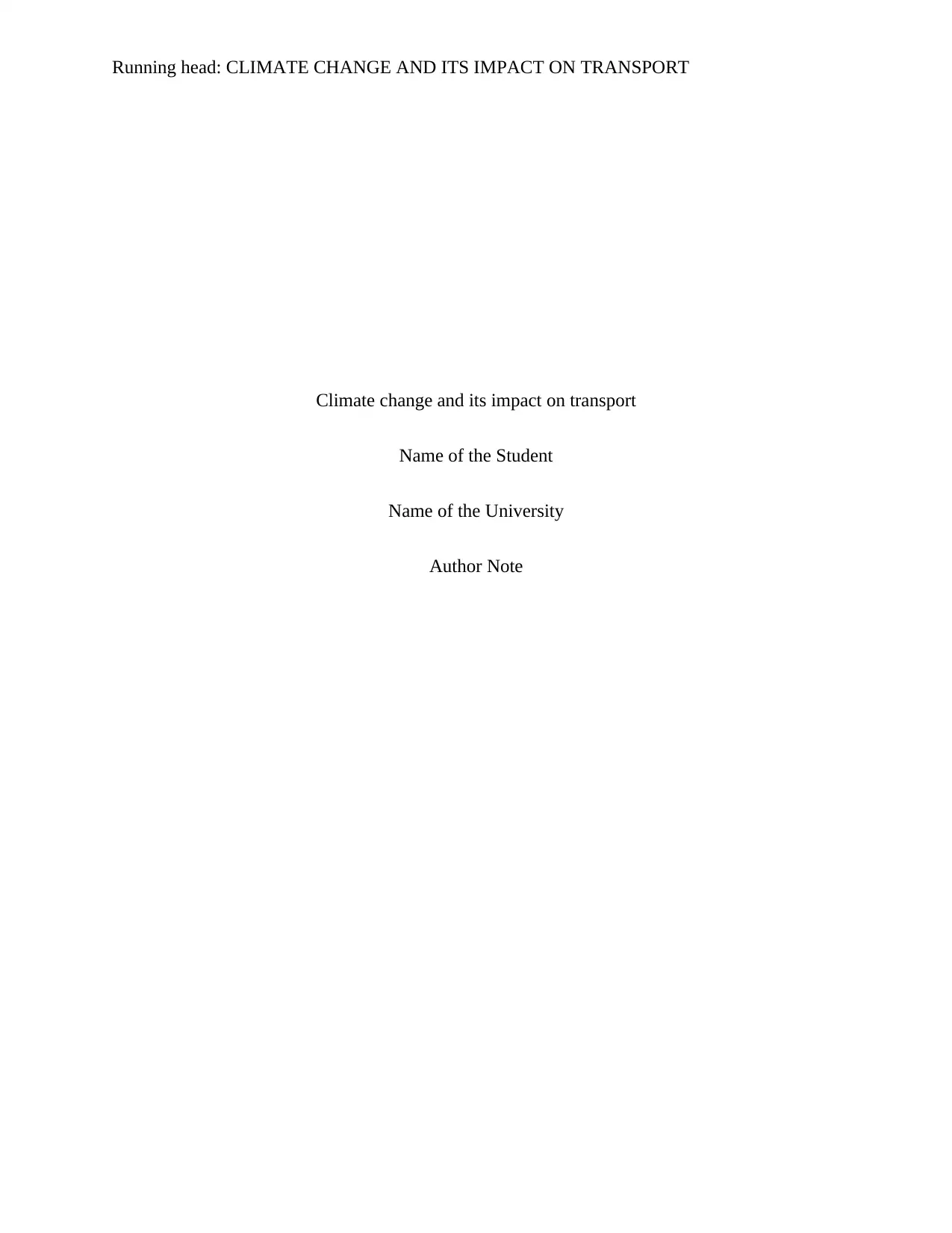
Running head: CLIMATE CHANGE AND ITS IMPACT ON TRANSPORT
Climate change and its impact on transport
Name of the Student
Name of the University
Author Note
Climate change and its impact on transport
Name of the Student
Name of the University
Author Note
Paraphrase This Document
Need a fresh take? Get an instant paraphrase of this document with our AI Paraphraser
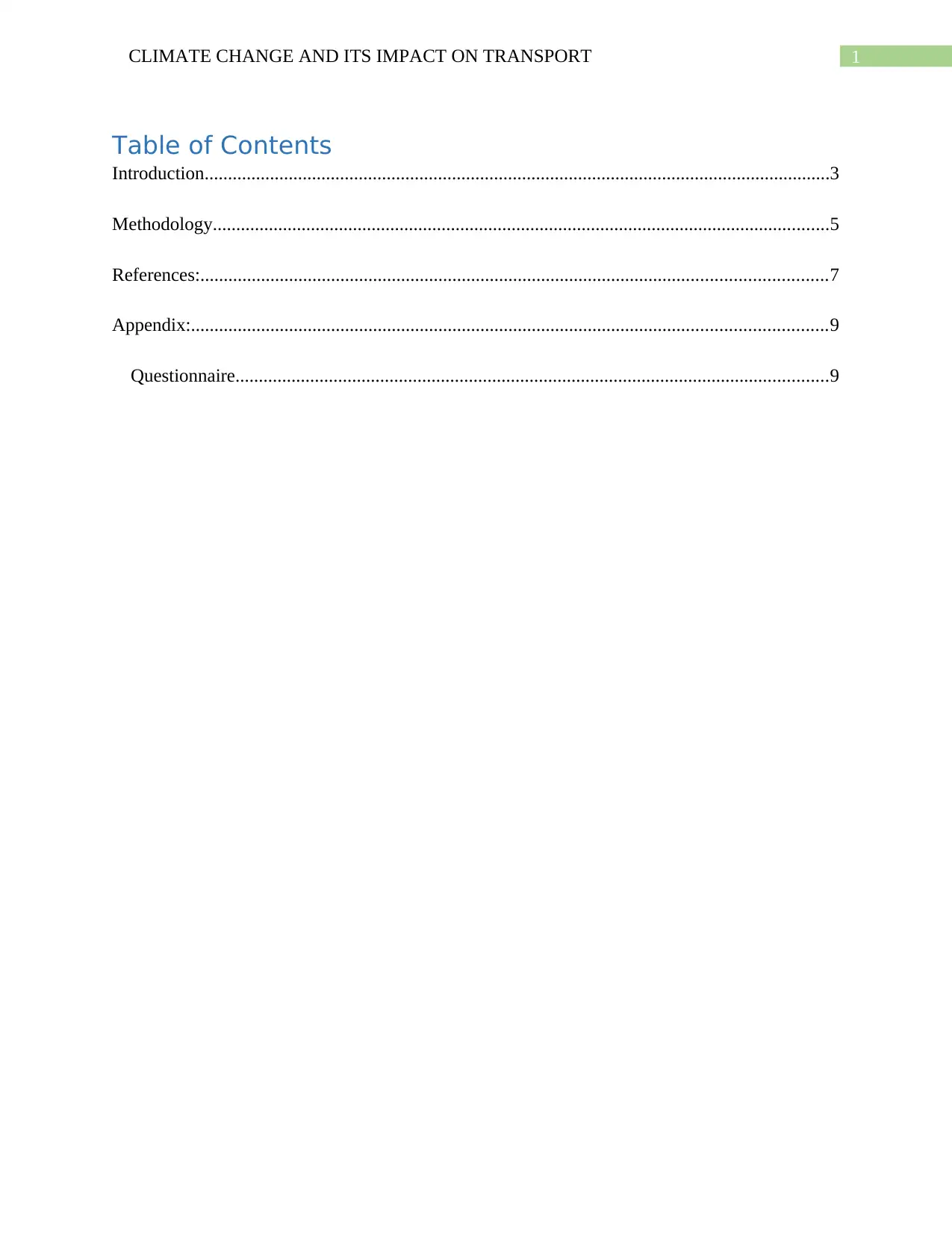
1CLIMATE CHANGE AND ITS IMPACT ON TRANSPORT
Table of Contents
Introduction......................................................................................................................................3
Methodology....................................................................................................................................5
References:......................................................................................................................................7
Appendix:........................................................................................................................................9
Questionnaire...............................................................................................................................9
Table of Contents
Introduction......................................................................................................................................3
Methodology....................................................................................................................................5
References:......................................................................................................................................7
Appendix:........................................................................................................................................9
Questionnaire...............................................................................................................................9
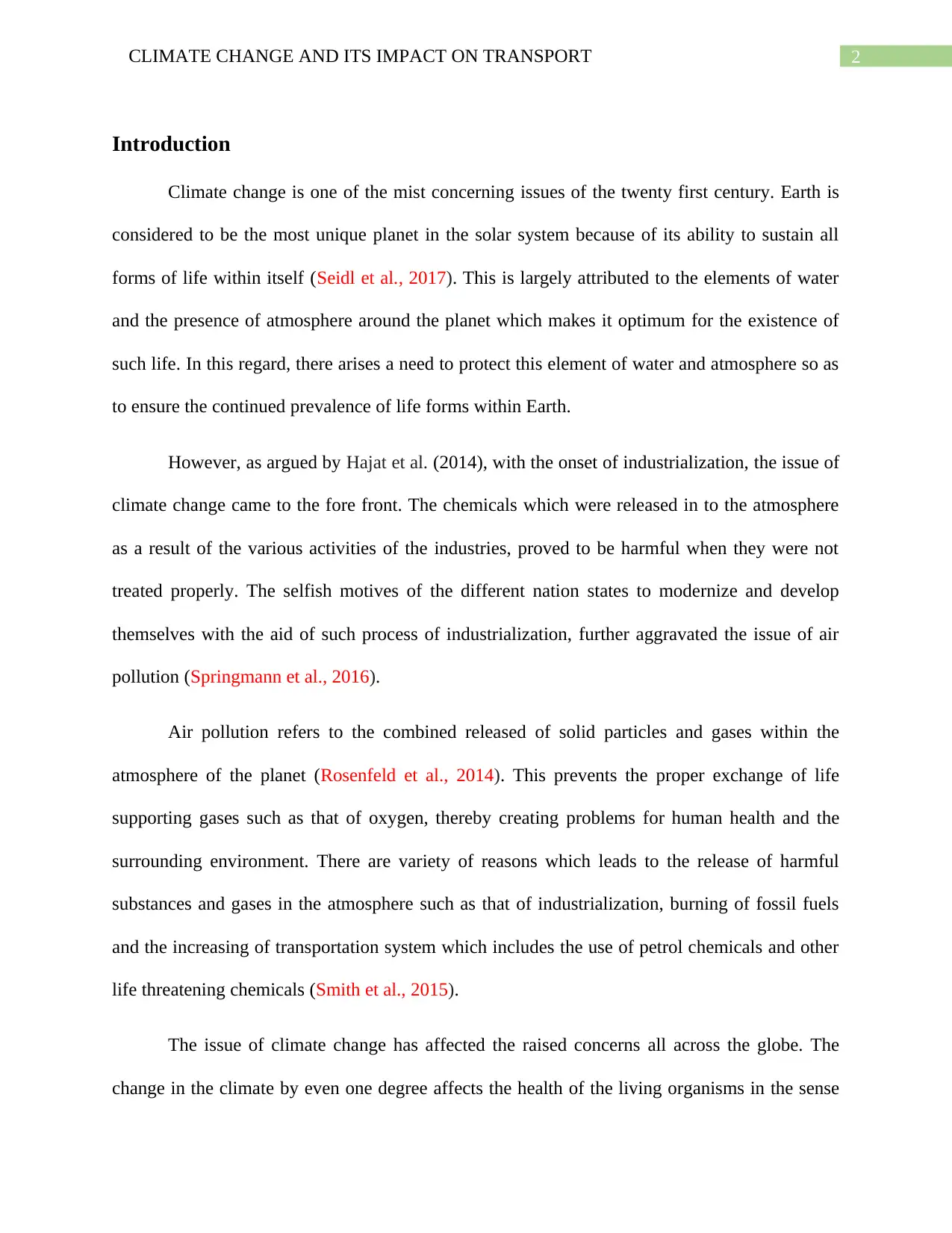
2CLIMATE CHANGE AND ITS IMPACT ON TRANSPORT
Introduction
Climate change is one of the mist concerning issues of the twenty first century. Earth is
considered to be the most unique planet in the solar system because of its ability to sustain all
forms of life within itself (Seidl et al., 2017). This is largely attributed to the elements of water
and the presence of atmosphere around the planet which makes it optimum for the existence of
such life. In this regard, there arises a need to protect this element of water and atmosphere so as
to ensure the continued prevalence of life forms within Earth.
However, as argued by Hajat et al. (2014), with the onset of industrialization, the issue of
climate change came to the fore front. The chemicals which were released in to the atmosphere
as a result of the various activities of the industries, proved to be harmful when they were not
treated properly. The selfish motives of the different nation states to modernize and develop
themselves with the aid of such process of industrialization, further aggravated the issue of air
pollution (Springmann et al., 2016).
Air pollution refers to the combined released of solid particles and gases within the
atmosphere of the planet (Rosenfeld et al., 2014). This prevents the proper exchange of life
supporting gases such as that of oxygen, thereby creating problems for human health and the
surrounding environment. There are variety of reasons which leads to the release of harmful
substances and gases in the atmosphere such as that of industrialization, burning of fossil fuels
and the increasing of transportation system which includes the use of petrol chemicals and other
life threatening chemicals (Smith et al., 2015).
The issue of climate change has affected the raised concerns all across the globe. The
change in the climate by even one degree affects the health of the living organisms in the sense
Introduction
Climate change is one of the mist concerning issues of the twenty first century. Earth is
considered to be the most unique planet in the solar system because of its ability to sustain all
forms of life within itself (Seidl et al., 2017). This is largely attributed to the elements of water
and the presence of atmosphere around the planet which makes it optimum for the existence of
such life. In this regard, there arises a need to protect this element of water and atmosphere so as
to ensure the continued prevalence of life forms within Earth.
However, as argued by Hajat et al. (2014), with the onset of industrialization, the issue of
climate change came to the fore front. The chemicals which were released in to the atmosphere
as a result of the various activities of the industries, proved to be harmful when they were not
treated properly. The selfish motives of the different nation states to modernize and develop
themselves with the aid of such process of industrialization, further aggravated the issue of air
pollution (Springmann et al., 2016).
Air pollution refers to the combined released of solid particles and gases within the
atmosphere of the planet (Rosenfeld et al., 2014). This prevents the proper exchange of life
supporting gases such as that of oxygen, thereby creating problems for human health and the
surrounding environment. There are variety of reasons which leads to the release of harmful
substances and gases in the atmosphere such as that of industrialization, burning of fossil fuels
and the increasing of transportation system which includes the use of petrol chemicals and other
life threatening chemicals (Smith et al., 2015).
The issue of climate change has affected the raised concerns all across the globe. The
change in the climate by even one degree affects the health of the living organisms in the sense
⊘ This is a preview!⊘
Do you want full access?
Subscribe today to unlock all pages.

Trusted by 1+ million students worldwide
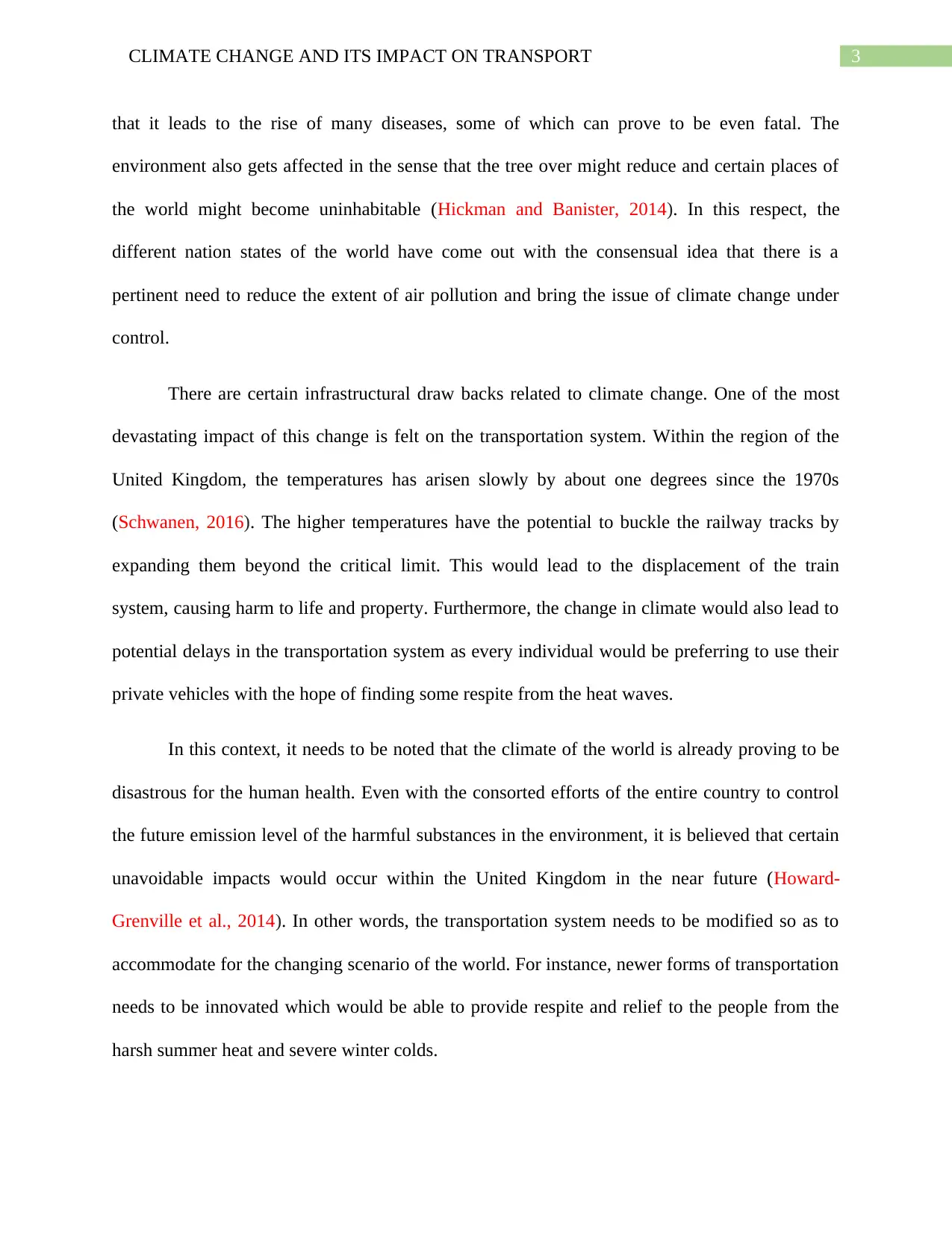
3CLIMATE CHANGE AND ITS IMPACT ON TRANSPORT
that it leads to the rise of many diseases, some of which can prove to be even fatal. The
environment also gets affected in the sense that the tree over might reduce and certain places of
the world might become uninhabitable (Hickman and Banister, 2014). In this respect, the
different nation states of the world have come out with the consensual idea that there is a
pertinent need to reduce the extent of air pollution and bring the issue of climate change under
control.
There are certain infrastructural draw backs related to climate change. One of the most
devastating impact of this change is felt on the transportation system. Within the region of the
United Kingdom, the temperatures has arisen slowly by about one degrees since the 1970s
(Schwanen, 2016). The higher temperatures have the potential to buckle the railway tracks by
expanding them beyond the critical limit. This would lead to the displacement of the train
system, causing harm to life and property. Furthermore, the change in climate would also lead to
potential delays in the transportation system as every individual would be preferring to use their
private vehicles with the hope of finding some respite from the heat waves.
In this context, it needs to be noted that the climate of the world is already proving to be
disastrous for the human health. Even with the consorted efforts of the entire country to control
the future emission level of the harmful substances in the environment, it is believed that certain
unavoidable impacts would occur within the United Kingdom in the near future (Howard-
Grenville et al., 2014). In other words, the transportation system needs to be modified so as to
accommodate for the changing scenario of the world. For instance, newer forms of transportation
needs to be innovated which would be able to provide respite and relief to the people from the
harsh summer heat and severe winter colds.
that it leads to the rise of many diseases, some of which can prove to be even fatal. The
environment also gets affected in the sense that the tree over might reduce and certain places of
the world might become uninhabitable (Hickman and Banister, 2014). In this respect, the
different nation states of the world have come out with the consensual idea that there is a
pertinent need to reduce the extent of air pollution and bring the issue of climate change under
control.
There are certain infrastructural draw backs related to climate change. One of the most
devastating impact of this change is felt on the transportation system. Within the region of the
United Kingdom, the temperatures has arisen slowly by about one degrees since the 1970s
(Schwanen, 2016). The higher temperatures have the potential to buckle the railway tracks by
expanding them beyond the critical limit. This would lead to the displacement of the train
system, causing harm to life and property. Furthermore, the change in climate would also lead to
potential delays in the transportation system as every individual would be preferring to use their
private vehicles with the hope of finding some respite from the heat waves.
In this context, it needs to be noted that the climate of the world is already proving to be
disastrous for the human health. Even with the consorted efforts of the entire country to control
the future emission level of the harmful substances in the environment, it is believed that certain
unavoidable impacts would occur within the United Kingdom in the near future (Howard-
Grenville et al., 2014). In other words, the transportation system needs to be modified so as to
accommodate for the changing scenario of the world. For instance, newer forms of transportation
needs to be innovated which would be able to provide respite and relief to the people from the
harsh summer heat and severe winter colds.
Paraphrase This Document
Need a fresh take? Get an instant paraphrase of this document with our AI Paraphraser
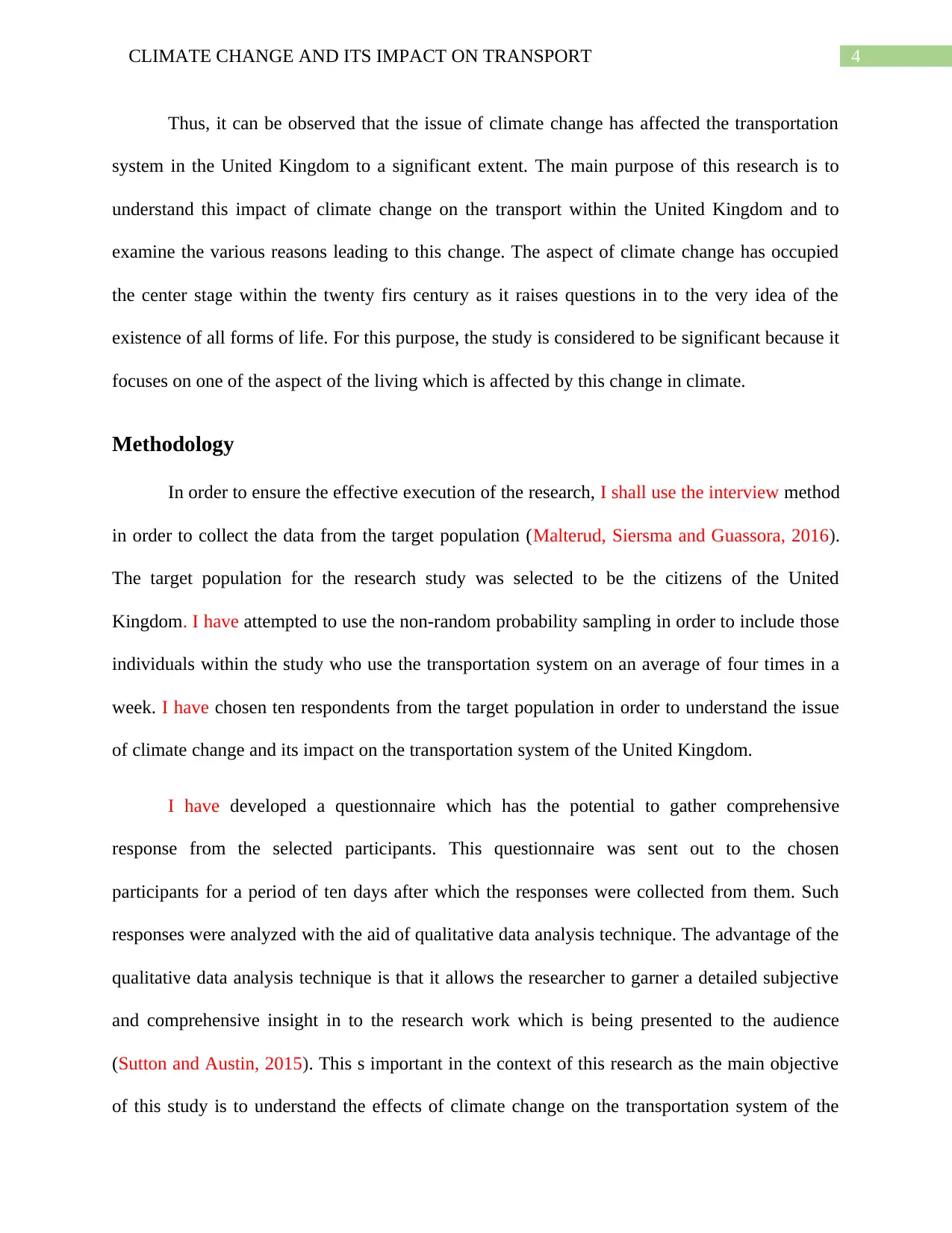
4CLIMATE CHANGE AND ITS IMPACT ON TRANSPORT
Thus, it can be observed that the issue of climate change has affected the transportation
system in the United Kingdom to a significant extent. The main purpose of this research is to
understand this impact of climate change on the transport within the United Kingdom and to
examine the various reasons leading to this change. The aspect of climate change has occupied
the center stage within the twenty firs century as it raises questions in to the very idea of the
existence of all forms of life. For this purpose, the study is considered to be significant because it
focuses on one of the aspect of the living which is affected by this change in climate.
Methodology
In order to ensure the effective execution of the research, I shall use the interview method
in order to collect the data from the target population (Malterud, Siersma and Guassora, 2016).
The target population for the research study was selected to be the citizens of the United
Kingdom. I have attempted to use the non-random probability sampling in order to include those
individuals within the study who use the transportation system on an average of four times in a
week. I have chosen ten respondents from the target population in order to understand the issue
of climate change and its impact on the transportation system of the United Kingdom.
I have developed a questionnaire which has the potential to gather comprehensive
response from the selected participants. This questionnaire was sent out to the chosen
participants for a period of ten days after which the responses were collected from them. Such
responses were analyzed with the aid of qualitative data analysis technique. The advantage of the
qualitative data analysis technique is that it allows the researcher to garner a detailed subjective
and comprehensive insight in to the research work which is being presented to the audience
(Sutton and Austin, 2015). This s important in the context of this research as the main objective
of this study is to understand the effects of climate change on the transportation system of the
Thus, it can be observed that the issue of climate change has affected the transportation
system in the United Kingdom to a significant extent. The main purpose of this research is to
understand this impact of climate change on the transport within the United Kingdom and to
examine the various reasons leading to this change. The aspect of climate change has occupied
the center stage within the twenty firs century as it raises questions in to the very idea of the
existence of all forms of life. For this purpose, the study is considered to be significant because it
focuses on one of the aspect of the living which is affected by this change in climate.
Methodology
In order to ensure the effective execution of the research, I shall use the interview method
in order to collect the data from the target population (Malterud, Siersma and Guassora, 2016).
The target population for the research study was selected to be the citizens of the United
Kingdom. I have attempted to use the non-random probability sampling in order to include those
individuals within the study who use the transportation system on an average of four times in a
week. I have chosen ten respondents from the target population in order to understand the issue
of climate change and its impact on the transportation system of the United Kingdom.
I have developed a questionnaire which has the potential to gather comprehensive
response from the selected participants. This questionnaire was sent out to the chosen
participants for a period of ten days after which the responses were collected from them. Such
responses were analyzed with the aid of qualitative data analysis technique. The advantage of the
qualitative data analysis technique is that it allows the researcher to garner a detailed subjective
and comprehensive insight in to the research work which is being presented to the audience
(Sutton and Austin, 2015). This s important in the context of this research as the main objective
of this study is to understand the effects of climate change on the transportation system of the

5CLIMATE CHANGE AND ITS IMPACT ON TRANSPORT
United Kingdom. To this extent, the primary form of data collection and the qualitative analysis
of such data has provided the requisite information to the researcher to make this study a success.
United Kingdom. To this extent, the primary form of data collection and the qualitative analysis
of such data has provided the requisite information to the researcher to make this study a success.
⊘ This is a preview!⊘
Do you want full access?
Subscribe today to unlock all pages.

Trusted by 1+ million students worldwide
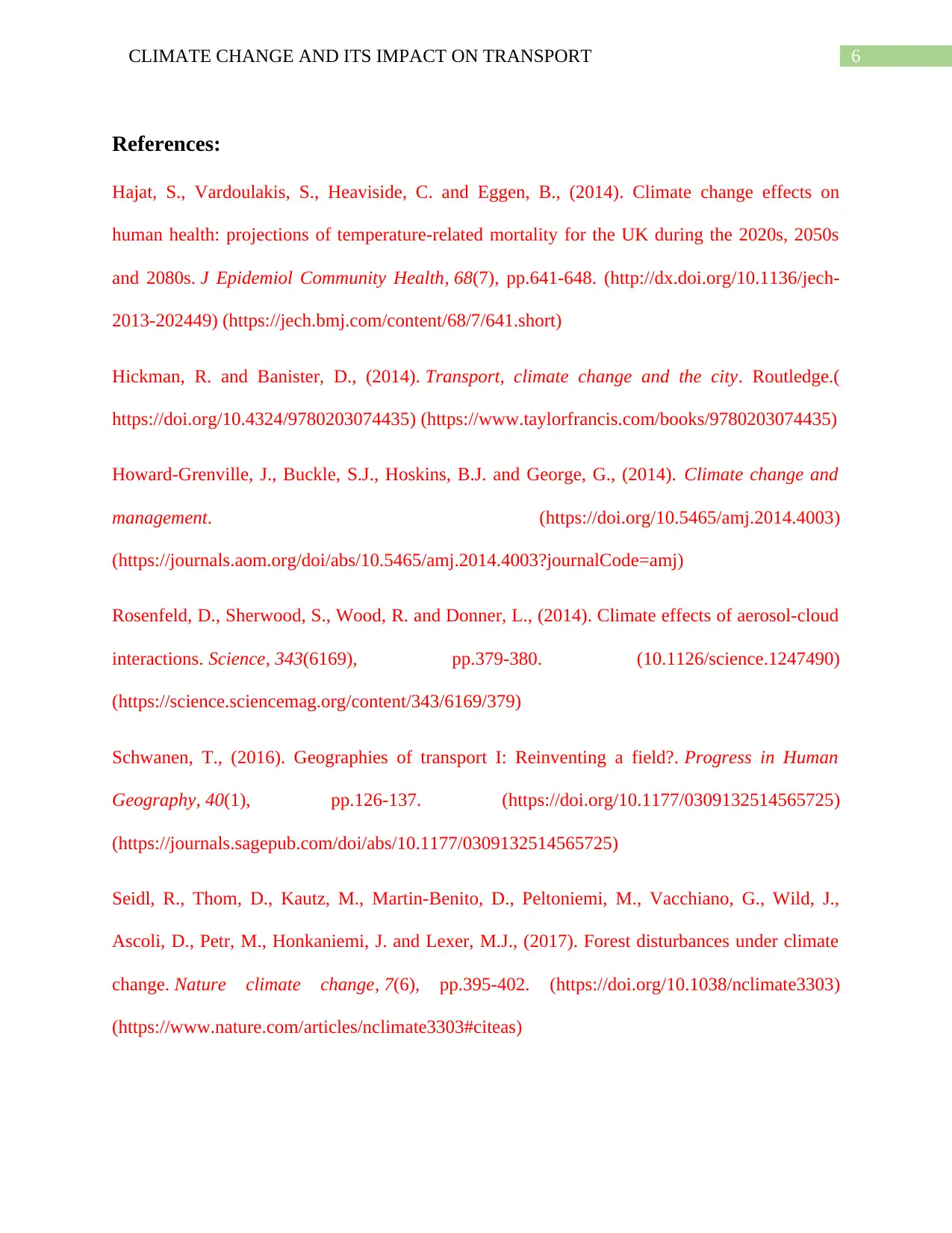
6CLIMATE CHANGE AND ITS IMPACT ON TRANSPORT
References:
Hajat, S., Vardoulakis, S., Heaviside, C. and Eggen, B., (2014). Climate change effects on
human health: projections of temperature-related mortality for the UK during the 2020s, 2050s
and 2080s. J Epidemiol Community Health, 68(7), pp.641-648. (http://dx.doi.org/10.1136/jech-
2013-202449) (https://jech.bmj.com/content/68/7/641.short)
Hickman, R. and Banister, D., (2014). Transport, climate change and the city. Routledge.(
https://doi.org/10.4324/9780203074435) (https://www.taylorfrancis.com/books/9780203074435)
Howard-Grenville, J., Buckle, S.J., Hoskins, B.J. and George, G., (2014). Climate change and
management. (https://doi.org/10.5465/amj.2014.4003)
(https://journals.aom.org/doi/abs/10.5465/amj.2014.4003?journalCode=amj)
Rosenfeld, D., Sherwood, S., Wood, R. and Donner, L., (2014). Climate effects of aerosol-cloud
interactions. Science, 343(6169), pp.379-380. (10.1126/science.1247490)
(https://science.sciencemag.org/content/343/6169/379)
Schwanen, T., (2016). Geographies of transport I: Reinventing a field?. Progress in Human
Geography, 40(1), pp.126-137. (https://doi.org/10.1177/0309132514565725)
(https://journals.sagepub.com/doi/abs/10.1177/0309132514565725)
Seidl, R., Thom, D., Kautz, M., Martin-Benito, D., Peltoniemi, M., Vacchiano, G., Wild, J.,
Ascoli, D., Petr, M., Honkaniemi, J. and Lexer, M.J., (2017). Forest disturbances under climate
change. Nature climate change, 7(6), pp.395-402. (https://doi.org/10.1038/nclimate3303)
(https://www.nature.com/articles/nclimate3303#citeas)
References:
Hajat, S., Vardoulakis, S., Heaviside, C. and Eggen, B., (2014). Climate change effects on
human health: projections of temperature-related mortality for the UK during the 2020s, 2050s
and 2080s. J Epidemiol Community Health, 68(7), pp.641-648. (http://dx.doi.org/10.1136/jech-
2013-202449) (https://jech.bmj.com/content/68/7/641.short)
Hickman, R. and Banister, D., (2014). Transport, climate change and the city. Routledge.(
https://doi.org/10.4324/9780203074435) (https://www.taylorfrancis.com/books/9780203074435)
Howard-Grenville, J., Buckle, S.J., Hoskins, B.J. and George, G., (2014). Climate change and
management. (https://doi.org/10.5465/amj.2014.4003)
(https://journals.aom.org/doi/abs/10.5465/amj.2014.4003?journalCode=amj)
Rosenfeld, D., Sherwood, S., Wood, R. and Donner, L., (2014). Climate effects of aerosol-cloud
interactions. Science, 343(6169), pp.379-380. (10.1126/science.1247490)
(https://science.sciencemag.org/content/343/6169/379)
Schwanen, T., (2016). Geographies of transport I: Reinventing a field?. Progress in Human
Geography, 40(1), pp.126-137. (https://doi.org/10.1177/0309132514565725)
(https://journals.sagepub.com/doi/abs/10.1177/0309132514565725)
Seidl, R., Thom, D., Kautz, M., Martin-Benito, D., Peltoniemi, M., Vacchiano, G., Wild, J.,
Ascoli, D., Petr, M., Honkaniemi, J. and Lexer, M.J., (2017). Forest disturbances under climate
change. Nature climate change, 7(6), pp.395-402. (https://doi.org/10.1038/nclimate3303)
(https://www.nature.com/articles/nclimate3303#citeas)
Paraphrase This Document
Need a fresh take? Get an instant paraphrase of this document with our AI Paraphraser
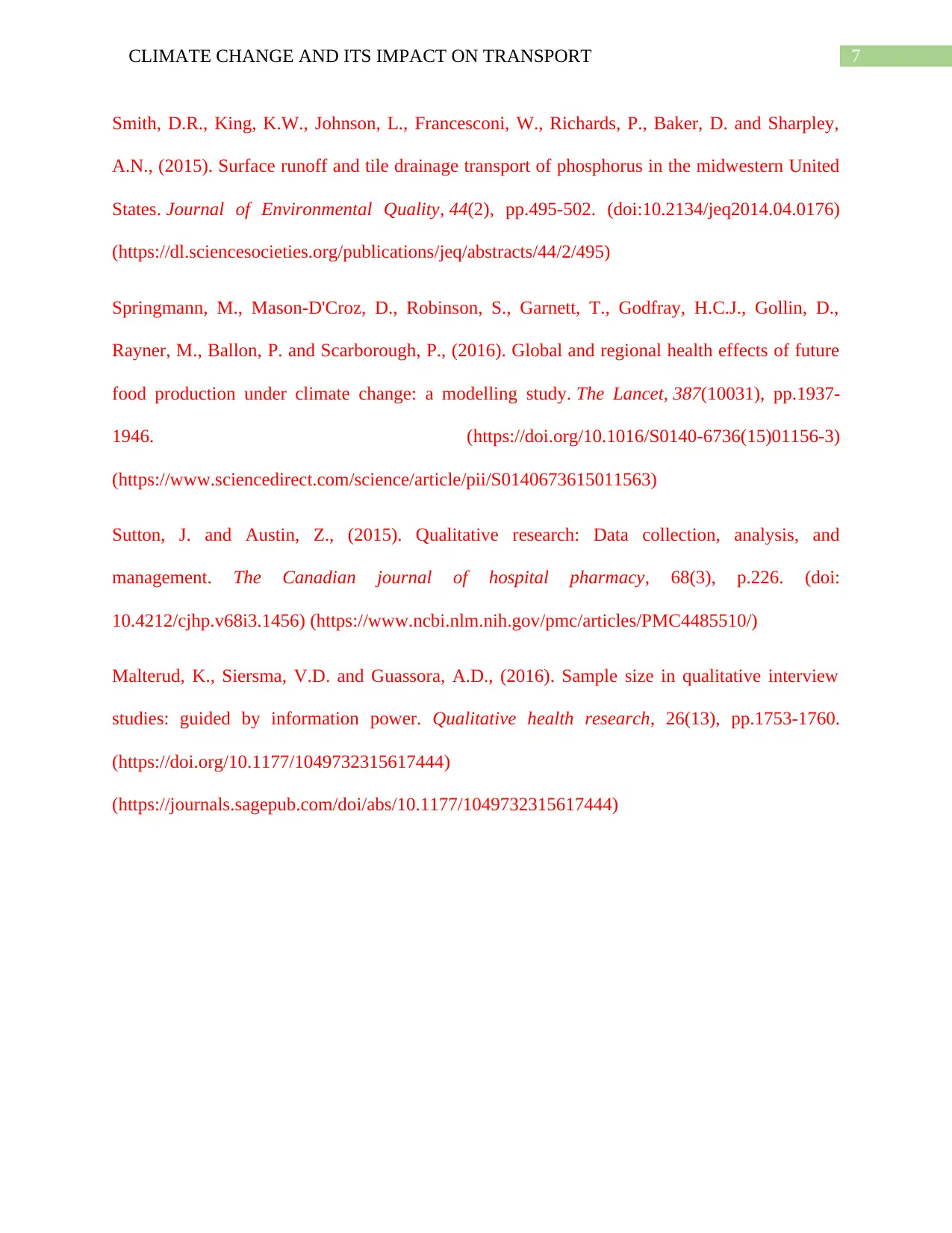
7CLIMATE CHANGE AND ITS IMPACT ON TRANSPORT
Smith, D.R., King, K.W., Johnson, L., Francesconi, W., Richards, P., Baker, D. and Sharpley,
A.N., (2015). Surface runoff and tile drainage transport of phosphorus in the midwestern United
States. Journal of Environmental Quality, 44(2), pp.495-502. (doi:10.2134/jeq2014.04.0176)
(https://dl.sciencesocieties.org/publications/jeq/abstracts/44/2/495)
Springmann, M., Mason-D'Croz, D., Robinson, S., Garnett, T., Godfray, H.C.J., Gollin, D.,
Rayner, M., Ballon, P. and Scarborough, P., (2016). Global and regional health effects of future
food production under climate change: a modelling study. The Lancet, 387(10031), pp.1937-
1946. (https://doi.org/10.1016/S0140-6736(15)01156-3)
(https://www.sciencedirect.com/science/article/pii/S0140673615011563)
Sutton, J. and Austin, Z., (2015). Qualitative research: Data collection, analysis, and
management. The Canadian journal of hospital pharmacy, 68(3), p.226. (doi:
10.4212/cjhp.v68i3.1456) (https://www.ncbi.nlm.nih.gov/pmc/articles/PMC4485510/)
Malterud, K., Siersma, V.D. and Guassora, A.D., (2016). Sample size in qualitative interview
studies: guided by information power. Qualitative health research, 26(13), pp.1753-1760.
(https://doi.org/10.1177/1049732315617444)
(https://journals.sagepub.com/doi/abs/10.1177/1049732315617444)
Smith, D.R., King, K.W., Johnson, L., Francesconi, W., Richards, P., Baker, D. and Sharpley,
A.N., (2015). Surface runoff and tile drainage transport of phosphorus in the midwestern United
States. Journal of Environmental Quality, 44(2), pp.495-502. (doi:10.2134/jeq2014.04.0176)
(https://dl.sciencesocieties.org/publications/jeq/abstracts/44/2/495)
Springmann, M., Mason-D'Croz, D., Robinson, S., Garnett, T., Godfray, H.C.J., Gollin, D.,
Rayner, M., Ballon, P. and Scarborough, P., (2016). Global and regional health effects of future
food production under climate change: a modelling study. The Lancet, 387(10031), pp.1937-
1946. (https://doi.org/10.1016/S0140-6736(15)01156-3)
(https://www.sciencedirect.com/science/article/pii/S0140673615011563)
Sutton, J. and Austin, Z., (2015). Qualitative research: Data collection, analysis, and
management. The Canadian journal of hospital pharmacy, 68(3), p.226. (doi:
10.4212/cjhp.v68i3.1456) (https://www.ncbi.nlm.nih.gov/pmc/articles/PMC4485510/)
Malterud, K., Siersma, V.D. and Guassora, A.D., (2016). Sample size in qualitative interview
studies: guided by information power. Qualitative health research, 26(13), pp.1753-1760.
(https://doi.org/10.1177/1049732315617444)
(https://journals.sagepub.com/doi/abs/10.1177/1049732315617444)
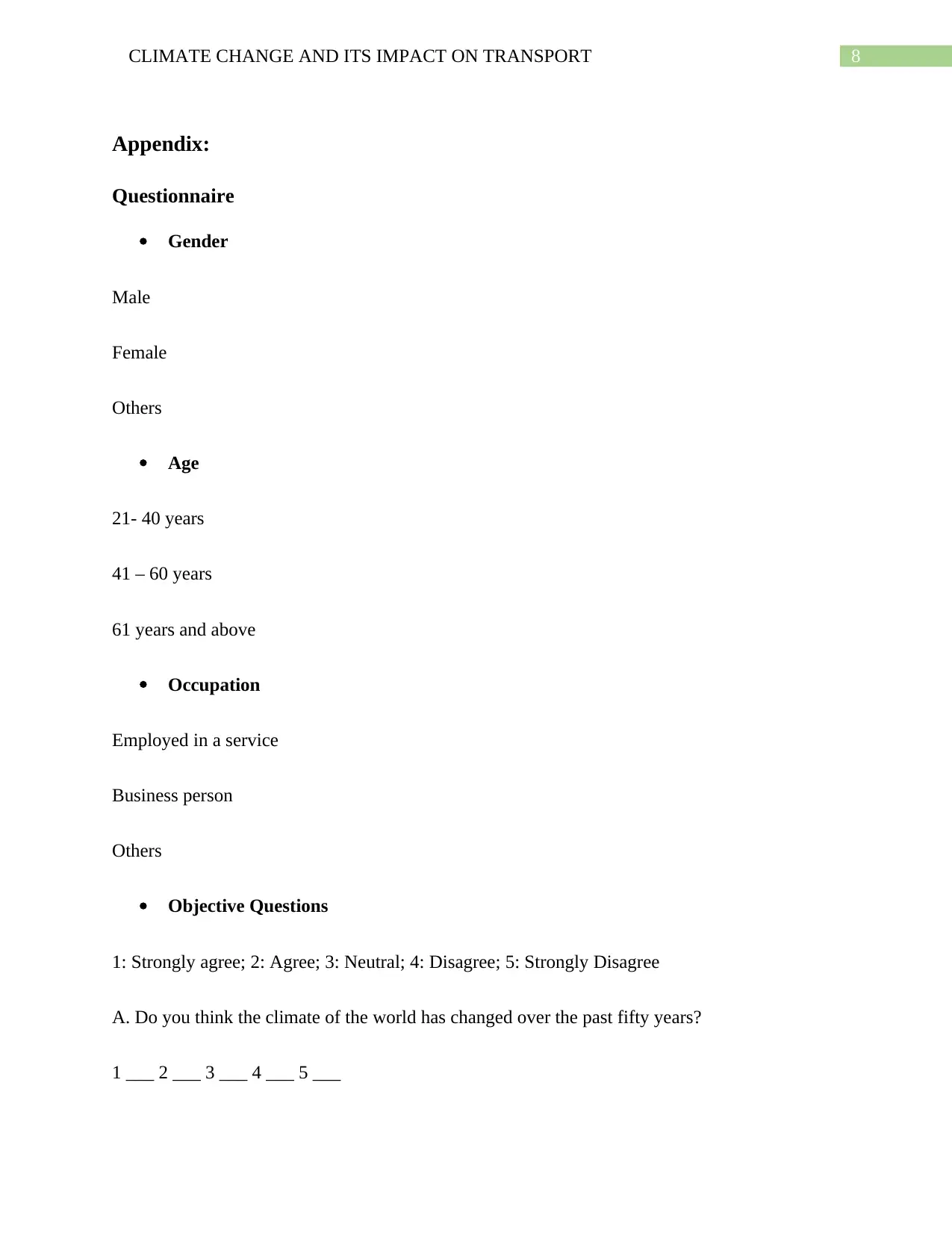
8CLIMATE CHANGE AND ITS IMPACT ON TRANSPORT
Appendix:
Questionnaire
Gender
Male
Female
Others
Age
21- 40 years
41 – 60 years
61 years and above
Occupation
Employed in a service
Business person
Others
Objective Questions
1: Strongly agree; 2: Agree; 3: Neutral; 4: Disagree; 5: Strongly Disagree
A. Do you think the climate of the world has changed over the past fifty years?
1 ___ 2 ___ 3 ___ 4 ___ 5 ___
Appendix:
Questionnaire
Gender
Male
Female
Others
Age
21- 40 years
41 – 60 years
61 years and above
Occupation
Employed in a service
Business person
Others
Objective Questions
1: Strongly agree; 2: Agree; 3: Neutral; 4: Disagree; 5: Strongly Disagree
A. Do you think the climate of the world has changed over the past fifty years?
1 ___ 2 ___ 3 ___ 4 ___ 5 ___
⊘ This is a preview!⊘
Do you want full access?
Subscribe today to unlock all pages.

Trusted by 1+ million students worldwide
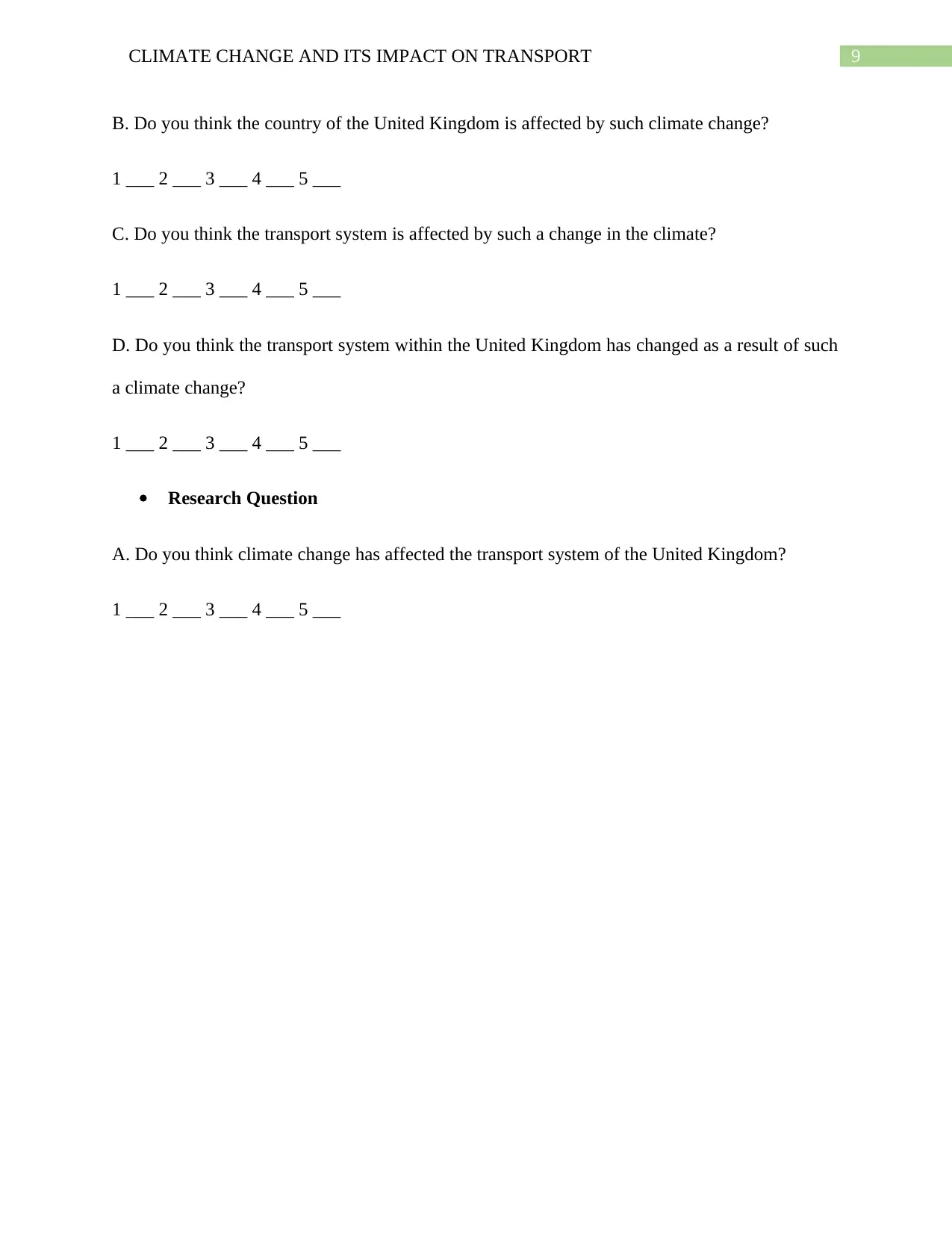
9CLIMATE CHANGE AND ITS IMPACT ON TRANSPORT
B. Do you think the country of the United Kingdom is affected by such climate change?
1 ___ 2 ___ 3 ___ 4 ___ 5 ___
C. Do you think the transport system is affected by such a change in the climate?
1 ___ 2 ___ 3 ___ 4 ___ 5 ___
D. Do you think the transport system within the United Kingdom has changed as a result of such
a climate change?
1 ___ 2 ___ 3 ___ 4 ___ 5 ___
Research Question
A. Do you think climate change has affected the transport system of the United Kingdom?
1 ___ 2 ___ 3 ___ 4 ___ 5 ___
B. Do you think the country of the United Kingdom is affected by such climate change?
1 ___ 2 ___ 3 ___ 4 ___ 5 ___
C. Do you think the transport system is affected by such a change in the climate?
1 ___ 2 ___ 3 ___ 4 ___ 5 ___
D. Do you think the transport system within the United Kingdom has changed as a result of such
a climate change?
1 ___ 2 ___ 3 ___ 4 ___ 5 ___
Research Question
A. Do you think climate change has affected the transport system of the United Kingdom?
1 ___ 2 ___ 3 ___ 4 ___ 5 ___
1 out of 10
Related Documents
Your All-in-One AI-Powered Toolkit for Academic Success.
+13062052269
info@desklib.com
Available 24*7 on WhatsApp / Email
![[object Object]](/_next/static/media/star-bottom.7253800d.svg)
Unlock your academic potential
Copyright © 2020–2026 A2Z Services. All Rights Reserved. Developed and managed by ZUCOL.





